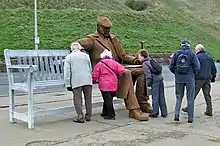Freddie Gilroy and the Belsen Stragglers
.jpg.webp)


Freddie Gilroy and the Belsen Stragglers is a statue by sculptor Ray Lonsdale which overlooks North Bay of Scarborough, England. Made from weathering steel, the sculpture depicts Freddie Gilroy, a former soldier who participated in the liberation of Bergen-Belsen concentration camp, sitting on a bench in his old age. Gilroy was a friend of the sculptor and Lonsdale made the piece partly as a tribute to him, but also as a wider war and Holocaust memorial. Originally intended to sit on the seafront as a 4-week loan in 2011, a local resident donated money to purchase the sculpture for the town.[1]
Description
Gilroy and the bench are sculpted at twice lifescale, making the figure almost 3.5 metres (11 ft) in length.[2] The sculpture, fabricated of weathering Corten steel, took artist Lonsdale three months to make.[3][4][5] Gilroy, a South Hetton brickmaker and colliery worker, served with the Royal Artillery during the Second World War and became one of the first Allied troops to help liberate Bergen-Belsen concentration camp in April 1945. He died in November 2008.[1][6]
Lonsdale created the sculpture as a commercial piece but also as a memorial to Gilroy and soldiers in general.[7] The sculpture itself contains no mention of the connection with Belsen or the war and at first appearance is just an old man sat on a bench.[8] Gilroy occupies one seat on the bench which, despite its height, offers visitors an opportunity to sit next to him.[9] A plaque is placed in the front centre of the bench, in common with memorial benches elsewhere on the seafront.[9] Text on the plaque includes a poem written by Lonsdale:[8][5]
"Freddie Gilroy and the Belsen Stragglers"They said for king and country
we should do as we were bid
They said old soldiers never die -
but plenty young ones didSculpture by Ray Lonsdale
in association with Artsbank (Saltburn)
Victoria Nesfield of the University of York, in her review of the piece said that "it occupies an unusual place between memorialization and art".[8] She noted that by offering a space for people to sit and pose with Gilroy Lonsdale has created a sculpture unlike most other holocaust memorials.[10] The term "Belsen stragglers" is a phrase used at the time of the liberation to describe the survivors of the camp.[8] The sculpture has been described as "much loved by people in the town".[11]
History
The sculpture was installed on Royal Albert Drive, Scarborough in a position overlooking the town's North Bay in November 2011.[4] The installation was initially supposed to be a 4-week exhibition provided via the Artsbank initiative, which promotes local artists through short-term loans.[7] The sculpture proved popular and a local appeal was set up to raise £50,000 to purchase the sculpture for the town. In December a local resident, Maureen Robinson donated £50,000 to the appeal, from her life savings.[1] Robinson dedicated the gift to her husband Michael to mark their wedding anniversary on 19 December.[5] The sculpture is now owned by Scarborough Borough Council and is considered a local landmark.[5][2]
At around 8 pm on 26 January 2012 the sculpture was vandalised with yellow gloss paint.[12] Due to the Belsen connection and for occurring on the eve of Holocaust Memorial Day an anti-Semitic motive was considered possible. The paint was removed by a council team on the day after the attack.[11]
Later in 2012 an explanatory plaque was added nearby.[8] Also in 2012 Lonsdale proposed that the piece be moved to a position overlooking South Bay near to the Rotunda Museum, as it was suffering corrosion from sea water in rough weather. The move was planned for January 2013.[4] Despite this, as of September 2020 the sculpture remained in its original location on Royal Albert Drive.[13]
Some of Lonsdale's other works are also located in the town, including The Tunney on Marine Drive, South Bay; The Smuggler's Apprentice on Merchant's Row, South Bay; A High Tide in Short Wellies in Filey and Pull Don't Push in Dalby Forest.[14] Another of Lonsdale's works, 1101, known popularly as Tommy, depicting a First World War Soldier is situated in Seaham, County Durham.[15]
References
- "Pensioner buys sculpture for town". BBC News. 10 December 2011.
- Nesfield, Victoria (14 January 2016). Mediating Peace: Reconciliation through Visual Art, Music and Film. Cambridge Scholars Publishing. p. 39. ISBN 978-1-4438-8775-5.
- Woodhouse, Robert (July 2013). The Scarborough Book of Days. History Press. p. 346. ISBN 978-0-7524-9400-5.
- Swift, Nina (13 December 2012). "Sea-spray forces new location for Freddie". Scarborough News. Retrieved 23 August 2020.
- Plaque at the statue site
- "From Tommy to Tunny: Where to discover creator's work". Sunderland Echo. 9 July 2016. Retrieved 23 August 2020.
- Nesfield, Victoria (14 January 2016). Mediating Peace: Reconciliation through Visual Art, Music and Film. Cambridge Scholars Publishing. p. 38. ISBN 978-1-4438-8775-5.
- Nesfield, Victoria (14 January 2016). Mediating Peace: Reconciliation through Visual Art, Music and Film. Cambridge Scholars Publishing. p. 40. ISBN 978-1-4438-8775-5.
- Nesfield, Victoria (14 January 2016). Mediating Peace: Reconciliation through Visual Art, Music and Film. Cambridge Scholars Publishing. p. 43. ISBN 978-1-4438-8775-5.
- Nesfield, Victoria (14 January 2016). Mediating Peace: Reconciliation through Visual Art, Music and Film. Cambridge Scholars Publishing. p. 42. ISBN 978-1-4438-8775-5.
- "Race fears over statue vandalism". BBC News. 27 January 2012. Retrieved 23 August 2020.
- Westcott, Matt (27 January 2012). "Statue of Durham miner, Freddie Gilroy, targeted in vandal attack". The Northern Echo. Retrieved 23 August 2020.
- Macdonald, Corinne (4 March 2020). "Scarborough's Freddie Gilroy statue inspires brain tumour awareness campaign and charity competition". The Scarborough News. Retrieved 23 August 2020.
- Macdonald, Corinne (16 August 2019). "Artist who created Freddie Gilroy sculpture in Scarborough unveils similar new piece". Scarborough News. Retrieved 23 August 2020.
- "Money raised to buy soldier 'Tommy'". BBC News. 26 July 2014. Retrieved 24 August 2020.